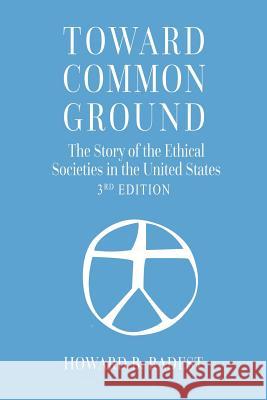Toward Common Ground - The Story of the Ethical Societies in the United States » książka
Toward Common Ground - The Story of the Ethical Societies in the United States
ISBN-13: 9780692280072 / Angielski / Miękka / 2015 / 322 str.
The experiment in moral religion called Ethical Culture was begun in America in the turbulent years following the Civil War. In 1876 its guiding impetus came from Felix Adler, whose quest for idealism drew to a "common ground" men and women from different walks of life, different faiths, even with different interpretations of moral religion. This diversity vitalized the movement that held as its "credo" the need to dissociate religion from myth, to evaluate changing values, and to incorporate what was worthwhile in contemporary values into the daily lives of men and women. This is an official history of Ethical Culture from its founding in 1876 up to its 75th Anniversary. Prof. Radest spent years compiling an archive of the movement's history from interviews with members who recalled the glowing early years of social reform and philosophic controversy, from letters and personal memoirs by Leaders, and from scrupulous research into the programs and policies initiated and evolved over the years. It is never dry history: a history of Ethical Culture is a history of its times. So many programs of social reform received impetus or were aided by the society - schools, settlement houses, home visits by nurses, legal aid, child-care, civil rights. Reading "Toward Common Ground" accesses persuasive evidence that the vitality of Ethical Culture is retained in its commitment to idealism as a challenge for the present and future. And the reading will be rewarding for all who are interested in American history - religious or social.
The experiment in moral religion called Ethical Culture was begun in America in the turbulent years following the Civil War. In 1876 its guiding impetus came from Felix Adler, whose quest for idealism drew to a "common ground" men and women from different walks of life, different faiths, even with different interpretations of moral religion. This diversity vitalized the movement that held as its "credo" the need to dissociate religion from myth, to evaluate changing values, and to incorporate what was worthwhile in contemporary values into the daily lives of men and women. This is an official history of Ethical Culture from its founding in 1876 up to its 75th Anniversary. Prof. Radest spent years compiling an archive of the movements history from interviews with members who recalled the glowing early years of social reform and philosophic controversy, from letters and personal memoirs by Leaders, and from scrupulous research into the programs and policies initiated and evolved over the years. It is never dry history: a history of Ethical Culture is a history of its times. So many programs of social reform received impetus or were aided by the society - schools, settlement houses, home visits by nurses, legal aid, child-care, civil rights. Reading "Toward Common Ground" accesses persuasive evidence that the vitality of Ethical Culture is retained in its commitment to idealism as a challenge for the present and future. And the reading will be rewarding for all who are interested in American history - religious or social.











